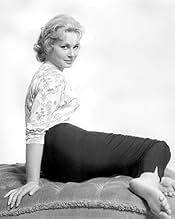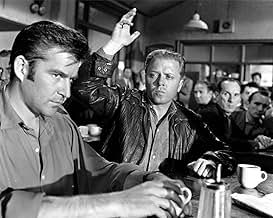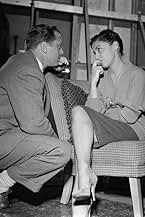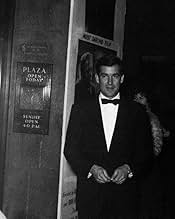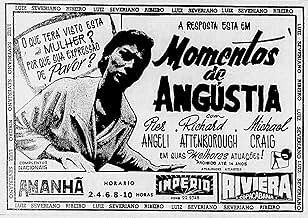IMDb-BEWERTUNG
7,2/10
1792
IHRE BEWERTUNG
Füge eine Handlung in deiner Sprache hinzuA young factory worker decides to stand up against his workmates and fellow union members when they want to hold a wildcat strike.A young factory worker decides to stand up against his workmates and fellow union members when they want to hold a wildcat strike.A young factory worker decides to stand up against his workmates and fellow union members when they want to hold a wildcat strike.
- Regie
- Drehbuch
- Hauptbesetzung
- Für 1 Oscar nominiert
- 6 Gewinne & 6 Nominierungen insgesamt
Empfohlene Bewertungen
A film which shows how Britains factories worked in the 50s,a place which employs thousands of people,usually on low wages.The workers only protection is their union which of course is only fair.Then the union is taken over by a few dedicated socialists who then are manipulated by the far lft. .Everything that happens in this film is true to life,and shows that adults soon behave like spoilt children when they don't get there own way.The rights of the individual are soon gone,violence and bullying follows,the film ask questions and leaves you asking your self questions at the end.Well worth a watch 8/10
Guy Green's (1960) film of Bryan Forbes' screenplay is based on a treatment by Michael Craig and, brother, Richard Gregson. Set in London in the late 1950's it was the first release of the joint venture production company Beaver Films set up by Bryan Forbes and Richard Attenborough.
As the film opens, we join Tom Curtis (Richard Attenborough) at work in a small engineering factory beset with labour problems. Single-minded and fiercely independent, Curtis is slow to grasp the implications of the fomenting unrest among his workmates as they band together to challenge the management head-on in a dispute that ultimately leaves Curtis out in the cold.
We follow Curtis home at night where his workmate Joe Wallis (Michael Craig - also writer) lodges with Curtis, his wife Anna (Pier Angeli) and their young family.
But as industrial relations deteriorate at work we see Curtis becoming increasingly isolated and intimidated by his determined colleagues.
With solid performances from Bernard Lee (Bert Connolly), Geoffrey Keen (Davis) and Alfred Burke (Travers) as the sinister agitator, the audience sees Curtis left high and dry as even the management feel compelled to abandon him.
Increasingly out of his depth, we are drawn into Curtis' worsening situation as his family are also intimidated in an effort to break his indomitable will.
This film captures something of the early struggle for recognition by employees in small firms like this before employment protection became enshrined in the law of the land. It gives us a feel for the situation of the casualties along the way and the forces at play.
As the film opens, we join Tom Curtis (Richard Attenborough) at work in a small engineering factory beset with labour problems. Single-minded and fiercely independent, Curtis is slow to grasp the implications of the fomenting unrest among his workmates as they band together to challenge the management head-on in a dispute that ultimately leaves Curtis out in the cold.
We follow Curtis home at night where his workmate Joe Wallis (Michael Craig - also writer) lodges with Curtis, his wife Anna (Pier Angeli) and their young family.
But as industrial relations deteriorate at work we see Curtis becoming increasingly isolated and intimidated by his determined colleagues.
With solid performances from Bernard Lee (Bert Connolly), Geoffrey Keen (Davis) and Alfred Burke (Travers) as the sinister agitator, the audience sees Curtis left high and dry as even the management feel compelled to abandon him.
Increasingly out of his depth, we are drawn into Curtis' worsening situation as his family are also intimidated in an effort to break his indomitable will.
This film captures something of the early struggle for recognition by employees in small firms like this before employment protection became enshrined in the law of the land. It gives us a feel for the situation of the casualties along the way and the forces at play.
Though Richard Attenborough takes top billing in this drama, I think Bernard Lee actually delivers the more potent performance as the shop steward "Bert". He calls for an unofficial strike of the workers at an engineering plant. Out they go, well most of them do - and it is soon clear to the audience that there is an agitator amongst the workforce intent on using this dispute for a greater purpose. We also encounter a few local hoodlums who have few scruples when it comes to persecuting - violently at times - those few workers who cross their picket line and continue to work. "Curtis" (Attenborough) is one such man. He already has a young son, and his wife is expecting his second child - so money is too tight for him not to get a wage. Pretty soon he is the victim of a vendetta from his erstwhile colleagues as they ostracise him completely. Director Bryan Forbes and co-star Michael Craig ("Wallace") had a hand in the writing and that is powerful. It generates a genuine sense of menace as those daring to break the strike find their property and their physical safety compromised whilst their erstwhile friends struggle with their consciences. Brian Bedford also stands out as the thuggish "Barrett" and there is also a potent, if sparing, contribution from Pier Angeli as the young man's wife "Anna". Ordinarily, one might expect this story to be about the abuse of power by an employer; here, though, the abuses are clearly coming from those with a broader agenda quite capable of mobilising a workforce of political sheep. The ending is rather rushed - almost incomplete, unfortunately but the ensemble and the toic work really well here to create a thought-provoking piece of cinema that packs a lot into ninety minutes.
I saw this film in my first year in law school in New York in 1991. A prior comment calls the film "right wing." Unfortunately, given the subsequent events in Britain in the 1970s and contemporary events in Detroit right now, it is prescient. Lord Attenborough's character faces a labor high noon many encounter in a union shop. One older worker in the film wants only to make a product that he is proud of. A pride that forces in the union movement obstruct. Anyone compelled to join a union by organizers who hire on only to unionize, will appreciate this film. I know. I've been there -- twice. White collar and blue collar jobs. That the film was made at all is amazing. But this often grim picture does have a comedic sibling -- the equally brilliant I'M ALL RIGHT JACK with Ian Carmichael and Peter Sellars. See both and you will understand what happened to Britain as well as too much of industrial America. If corporate greed has a partner, it is union executives who throw their members under a bus to save their jobs. THE ANGRY SILENCE should be required viewing for anyone who believes that political films -- not politicized films -- have a place in Hollywood. Heartbreaking story, economic direction, and brilliant acting. In dramatic black and white. The screenplay won a BAFTA Award for Bryan Forbes.
How did I never see this? Another Talking Pictures TV gem. Preceded the year before by the excellent and similarly themed comedic classic, I'm Alright Jack, this hard-hitting drama is an ideal counterpart. A strong cast, headed by Richard Attenborough, with his wife very well played by Pier Angeli. I particularly liked Alfred Burke's scheming, Marxist, union activist, book-ending the film with his arrival and departure - on public transport, of course. It also features Bond regulars, Bernard Lee and Geoffrey Keen, an early role for Oliver Reed, and playing himself, Alan Whicker. It's not quite Kitchen Sink, which had more of a fashionable, if usually grim theme, but is in a similar vein.
Ignore comments about it being 'far-right', they are ridiculous. The film is a well-balanced, politically centrist take that in no way demonises unions or strikes, although occasionally feels a bit heavy handed with some of its messages. Clearly, pre-1970s, there was still a battle going on for the hearts and minds of the working class. A prophetic warning of the far-left politics that was to come over the next decade. By the time 1971's very silly and misjudged, but better known, Carry On At Your Convenience arrived, the battle was lost. Beyond politics, this is essentially a universal story about bullying, group think and the individual, and reminded me a lot of my school days. It deserves to be better recognised and watched.
Ignore comments about it being 'far-right', they are ridiculous. The film is a well-balanced, politically centrist take that in no way demonises unions or strikes, although occasionally feels a bit heavy handed with some of its messages. Clearly, pre-1970s, there was still a battle going on for the hearts and minds of the working class. A prophetic warning of the far-left politics that was to come over the next decade. By the time 1971's very silly and misjudged, but better known, Carry On At Your Convenience arrived, the battle was lost. Beyond politics, this is essentially a universal story about bullying, group think and the individual, and reminded me a lot of my school days. It deserves to be better recognised and watched.
Wusstest du schon
- WissenswertesThis movie was initially banned in certain parts of Wales, as several cinemas were controlled by the miners' unions at that time. It was only when Richard Attenborough personally intervened and screened it for the union leaders that the ban was revoked.
- PatzerThe girl lying on the grass with the motorcyclist is flat on her back on the grass then the shot changes and she has her head raised with her head using a tree trunk as a pillow.
- Zitate
Tom Curtis: Shut up! Shut up will you! You don't have to worry about not talking to me. I don't want you to talk to me, do you hear? But you stay away from my family. Just stay away from us!
- VerbindungenFeatured in Film Review: Richard Attenborough (1968)
Top-Auswahl
Melde dich zum Bewerten an und greife auf die Watchlist für personalisierte Empfehlungen zu.
- How long is The Angry Silence?Powered by Alexa
Details
Box Office
- Budget
- 98.000 £ (geschätzt)
- Laufzeit1 Stunde 35 Minuten
- Farbe
- Seitenverhältnis
- 1.66 : 1
Zu dieser Seite beitragen
Bearbeitung vorschlagen oder fehlenden Inhalt hinzufügen

Oberste Lücke
By what name was Zorniges Schweigen (1960) officially released in India in English?
Antwort



